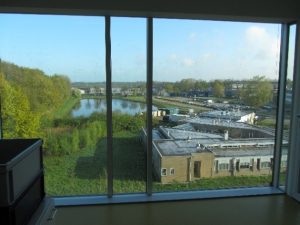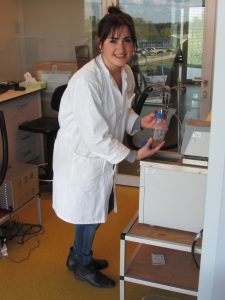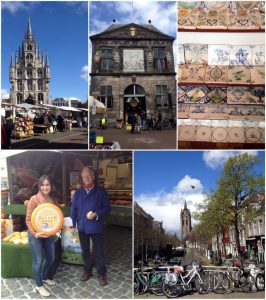Arrival in the Netherlands:
My flight landed at Schiphol (Amsterdam) on Monday, 14 March 2016. From Amsterdam I travelled to Ede-Wageningen station with the train and from Ede to Wageningen Campus with Bus 88 (total cost, €18). I first had to go to the Forum to collect my room key and sign the contract for accommodation at Beringhem, Bennekom. I would strongly recommend applying for accommodation at Beringhem, the rooms are spacious and you get to live in another town, which is close enough to comfortably cycle to Wageningen. At an extra cost, iNFacilities also provides you with bedding (duvet, cushion and covers). Some rooms (such as mine) has their own bathroom (with shower) and mini-kitchen (with small water basin). However, you will pay a bit extra for this option.
Introduction to Rikilt and administration:
The next day (15 March 2016) I was introduced to Rikilt (Wageningen UR) and the staff. I purchased a bicycle and finalised my temporary bank account (ABN AMRO Bank). When you buy a bicycle for such a short period I would recommend not paying more than €70. The reason being that it will be easier to sell it later at a slightly lower price, especially since students don’t want to pay too much. Having a Dutch bank account is also very convenient as most shops don’t accept South African credit or debit cards. The only negative thing is the application as you will only receive your bank card within 1-2 weeks time.
Facilities and analyses at Rikilt:
The research facilities at Rikilt is modern and organised with high-tech equipment. Every unit has a manager and for everything there is a person in control. The labs are cleaned daily by a cleaning company (even the glassware is cleaned for you) and the whole building is only accessible with your WUR card. They have a very organised HR department, which quickly finalised by contract and other official forms. Rikilt creates an atmosphere for productiveness, while they also make sure that the staff is fully equipped to perform their job. For example, stationary, working desks with computers, drinks (coffee and tea) and materials for labwork is supplied. WUR also has access to a lot more scientific journals than Stellenbosch University. During the first two weeks of my stay, I managed to complete my Literature review and submit it to an accredited academic journal for publication.
Before I commenced with the PTR-MS analyses, I was first introduced to the lab. It took me 1 month to complete the analyses for the 201 lamb meat and fat samples as I had to share the PTR-MS with other researchers. I also performed additional work by scanning the samples with the SCiO spectrometer (molecular sensor that fits in the palm of your hand). The data I will use in addition to that already obtained with the MircoNIR. After scanning of the samples I had to prepare the meat for PTR-MS. The meat was cut into smaller pieces, 5 g weighed into 250 mL glass bottles and equilibrated in a waterbath at 30°C for 30 min. It was then analysed using the PTR-MS. PTR-MS was also done on the fat removed from the chop. After the labwork, I started with the data analysis and interpretation of the results.


Returning to life in Stellenbosch / South Africa and changed perspective:
I was very sad to leave the Netherlands as I really enjoyed my stay and was just getting use to the tempo and lifestyle of the Dutch. I will definitely miss the landscapes, cycling, culture, trains and all the delicious cheeses, dairy products and stroopwafels (my absolute favourite).
Returning to life in Stellenbosch was better than I expected. I adapted quickly to the change in weather, people and driving on the left side of the road. I actually soon realised how much I missed communicating in Afrikaans and doing our own culture activities – such as braaiing. The travel to Europe have also changed and broadened my perspective in terms of our country’s economic and cultural situation. Compared to Europe, South Africa is a very young country – therefore a lot of change and development is expected. The future of the country is actually very bright and we should be grateful to live in such a naturesque and multi-cultural country. Generally, the people of South Africa are much more friendly, colourful and warm compared to the Europeans. Our level of education and work ethic at Stellenbosch University is also very high. I found that we tend to think forward, adapt to change or quickly make alternative plans. I am really proud to call myself a South African.
The last 3 months I have also learned a lot about myself. Travelling on my own, thinking on my feet, having to vend for myself and building relationships in the workplace have really enhanced my self-confidence, strengthened my emotional intelligence and made me much more independent. Being able to perform research in Europe not only open doors for you, but I believe it also makes your work more internationally recognised. It is also a valuable addition to one’s CV.
Future plans:
At the moment I am considering going back to Europe, either doing a post-doc or working in the Food Industry. I enjoy their productiveness, living standards and facilities. I also believe that this exchange have allowed me to strengthen my professional and international relationship with academics in my field of study. I hope that in the future it would open the door for work-related opportunities. However, currently I am focusing on finishing the writing of my thesis and publishing articles (of the work performed at Rikilt) in peer-reviewed journals. I am very grateful for all the bodies which funded me. Without their help it wouldn’t have been possible for me to go as a guest researcher to Rikilt and perform the PTR-MS analyses on the South African lamb meat samples.




